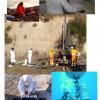Biogeochemistry and environmental fate of natural elements and contaminants
The ENEA-Environmental Biogeochemistry Lab operates in the field of environmental studies carrying out researches aimed at the implementation of methodological and technological innovation, following a multidisciplinary approach (geology, chemistry/geochemistry, microbiology, engineering, sensoristic, modelling). In the framework of the remediation interventions, it operates both in field and laboratory for the preliminary characterization and subsequent monitoring of remediation plans, frequently charged by authorities for the characterization of contaminated sites. Moreover, it is involved in the development and standardization of innovative models for predicting the behaviour of contaminants in the environment over time, the effects of the intervention strategies, the ecological, social and economical impacts of such interventions and for the application of these tools in contaminated sites risk analysis and decision-making process.
Microbial bio-technologies applied to the bio-remediation of contaminated soils, to the production of energy from biomass and to the conservation and restoration of cultural heritage are developed, by applying new approaches based on the harnessing of the microbial potential naturally occurring into the environmental matrixes intended to be treated.
Moreover, the Environmental Biogeochemistry Laboratory has a considerable expertise in nanomaterial production and synthesis, electrochemical interfaces for sensors and biosensors, microarray devices, sensor devices for productive systems development.

